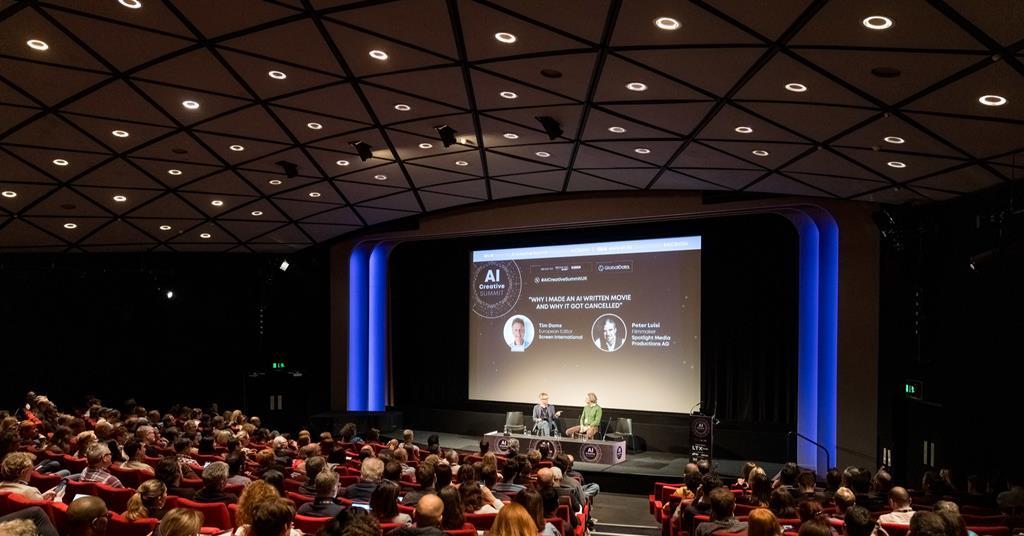AI Revolution on the Horizon: Experts Warn Industries to Brace for Disruption at Creative Summit

At the recent AI Creative Summit, held with much fanfare on November 6, industry insiders converged to discuss the seismic shifts brought about by Artificial Intelligence (AI) in the world of film and television. It was a gathering where concerns about AI began to ebb, much like the tide reluctantly retreating from the shore but still leaving hints of anxiety behind—such as job security and environmental concerns. One couldn’t help but feel that there was a collective sigh of relief permeating the atmosphere, underscored by a hearty dose of cautious optimism.
According to Cyrus Mewawalla, the head of thematic intelligence at GlobalData, generative AI is nothing short of a whirlwind, described aptly as “one of the fastest-growing technology cycles we’ve ever seen.” For context, ChatGPT took just two months to amass 100 million users, while TikTok required a leisurely nine months, and Netflix took a staggering 18 years. If this growth were a race, one might picture ChatGPT gleefully sprinting past the others while they panted and huffed. “You better pay attention,” Mewawalla warned, “because it’s going to disrupt your industry,” much like an unexpected guest at a quiet dinner party.
The day revealed a hopeful glimmer: 79% of summit delegates believed that AI's impact on the creative sector would be positive in the long term. Yet, balancing this optimism was a lingering concern, with about 90% advocating for stricter regulations on AI usage—because what’s a party without a few rules, right?
James Townley, chief content officer at Banijay, chimed in to reassure everyone that the climate was decidedly less fraught than a year prior. “We’re really focused on how we can leverage it for a positive for our creatives,” he said, echoing a sentiment that many attendees found comforting. It seemed that for numerous speakers, AI is a friend, helping to declutter our to-do lists by handling the repetitive, monotonous tasks that none of us signed up for.
Grace Boswood, the technology director at Channel 4, emphasized that AI would “allow us to do more with less.” Isn't that the dream for most of us? While we may not be getting fewer emails, a little AI assistance might just help minimize the drudgery involved in personalizing content for our social media feeds. “We have an infinite scope to personalize our content, but we don’t have an infinite number of people to create clips,” she lamented, echoing the plight of many a busy professional.
But for the creative souls among us, the looming question remains: will AI snatch away our artistic jobs? Jonny McCausland, the development lead at Hat Trick Lab, offered a reassuring counterpoint. “I can’t see a world where Hat Trick or any other production company starts replacing writers…that’s the whole fun of making art.” After all, who doesn’t revel in the beautiful mess of collaboration? Townley reinforced this idea by adding, “It’s about how we support our creatives with AI, empowering them.” Let this be known: artists are not going down without a fight.
Still, it’s hard to ignore the implications of automation, with many speakers acknowledging that reduced entry-level positions might become a stark reality. Basic tasks like logging rushes may fade into obsolescence, although new roles—think AI prompters—could rise from the ashes like a creative phoenix.
And then there’s the fascinating yet divisive topic of AI’s potential environmental impact. Kathryn Webb, CEO of AI specialist Amici, drew a comparison that would rattle any eco-conscious soul, stating that generating an image using a hefty AI model consumes as much energy as charging up your smartphone. Who knew AI could induce such existential environmental angst?
Beyond governance and regulations, there was an unyielding optimism among industry players about AI’s potential to democratize creativity. Channel 4’s Boswood revealed collaboration with Aardman and Charisma.ai to explore AI’s role in lowering barriers for diverse voices. “AI is a force that challenges power,” concluded McCausland, adding that it empowers individuals to unleash their creativity without spending a fortune.
All in all, the AI Creative Summit was a microcosm of the larger debate surrounding technology's role in our lives. As the dust settles, it appears the industry is poised for both growth and introspection, striking a balance between innovation and regulation. It’s clear that while AI is not here to replace human creativity, it certainly has a place at the table—a table that might just become more expansive, thanks to newfound tools and partnerships that aim to foster inclusivity and innovation.

